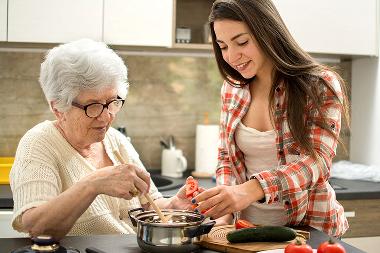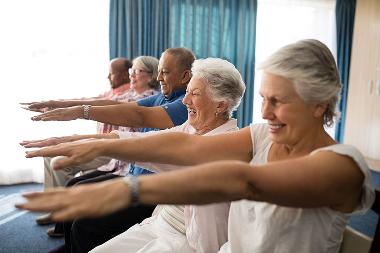For further information about our home care services or supported living in Greenwich and the greater London areas, please contact us at Myrtle Healthcare.

For further information about our home care services or supported living in Greenwich and the greater London areas, please contact us at Myrtle Healthcare.

Getting home care will enable your loved one to continue living in their home whilst getting the help they need. The need for home care is usually triggered by an event such as a fall, illness or death in the family.
If you are worried how a loved one will cope on their own you can always start small. Our carers will be able to discover whether your loved one needs more or less care and will give you the time you need to decide if it is possible for your loved one to continue living in their home.

A number of problems can be prevented if the right measures are taken beforehand. There are a number of critical signs that will give you an idea if your loved is struggling. This can include missed doctor appointments, social isolation and less participation in hobbies and interests.
If you are unable to check in weekly with loved ones, our home care specialists will be able to help your loved one in eating a balanced diet, staying healthy and socialising. Our team will ensure your loved one has everything they need to maintain their physical and mental wellbeing.

As your loved one gets older you may notice that their habits begin to change. They may eat less often, take longer at the supermarket or develop hearing problems. When this occurs, you may want to start thinking about home care for your loved one.
Eating healthy meals, partaking in social activities and meeting friends are integral to maintaining a healthy life. If you're unable to assist your loved one, our carers will be able to provide the support that will enable loved ones to maintain their health.
Choosing live-in care is a big decision but, in most cases, once you make the choice to have live-in care you quickly find that the benefits are enormous. However, having live-in care for the first time is a big change and does require some adjustment. There are always a few teething problems but to try and help you adapt we have outlined some of the things to expect and answered some of the most common questions that we get asked.
A live-in carer lives with you, in your home and has two main roles. Firstly, to look after you and secondly to help look after your home. A carer will normally stay for between two and four weeks and then hand-over to new carer. Many carers return to the same clients providing continuity of care and a familiar, friendly face.
Having someone you do not know suddenly live in your house is very strange for the first few days. However, things usually settle into a routine and clients and carers get to know and trust each other quickly. Most people find that the benefits and re-assurance of having a live-in carer improve their lives significantly.
With so much initial change it is easy to forget that it's all new for the carer too. When a carer starts a new placement, they need to get to know you, your family, your house, your routine and the local area. If client and carer help each other settle into the new routine, it makes a big difference.
One of the luxuries of live-in care is having all your meals prepared for you. Your carer will prepare all your meals and will adapt their cooking to any dietary requirements you may have, and wherever possible strive to prepare meals that you enjoy and that are nutritious. As well as preparing breakfast, lunch and supper carers will also prepare snacks and drinks during the day depending on your habits and likes.
Remember carers aren't caterers though and although they will usually be happy to cook extra portions if you have friends or family staying, they should not be expected to cook for extra people on a regular basis or to dinner party standards!
If you have a lot of people staying, maybe over holidays such as Christmas, it's a good idea to ask everyone to help out with preparing meals and clearing away so your carers workload is not over-stretched.
A carer will also usually eat their meals with you, and they are not expected to pay for their own meals unless they have very specific dietary requirements.
Part of a live-in carer's role is to keep your house clean and tidy. This includes light household duties such as clearing up after meals, washing up, dusting, vacuuming, making beds, laundry washing and ironing. However, they are not professional cleaners so please do not ask them to do major jobs such as spring-cleans, clean carpets etc.
A carer will, if required, do the grocery shopping. Clients usually provide a 'housekeeping float' for this and records are kept in the “At Home Care” logbook with receipts filed in the contact book.
All a carer's general shopping will be included on the client's shopping and at the client's cost i.e. food, cleaning products etc. Any individual luxury items that a carer requires will be at the carer's cost. If it is difficult for a carer to do the shopping, perhaps if a client cannot be left on their own/or be taken shopping, then a good alternative is to order the grocery shopping online which can be done at all major retailers i.e. Tesco, Waitrose etc.
Each client is assigned a carer based on his or her personal care needs. This can range from just wanting someone around for general help and companionship to needing assistance with mobility, dressing, washing, going to the loo, getting up in the morning and going to bed in the evening.
Carers can help clients remember when to take any medication. Under current guidelines carers' can only prompt and remind to take medication. Please never ask a carer to administer medication. Although some carers may have nursing backgrounds a carer can never act as a qualified nurse. Current good practice also states that care assistants should not be asked to fill a client's dossette box. If the client is unable to do so a pharmacist, GP or family member should carry out the task.
If you have a fall the first thing a carer will do is check for any signs of injury. If you are injured or you cannot get up without assistance, the carer will always call the paramedics. Carers can never lift you as they must not put you or themselves at risk of injury.
None of us function well if we don't get a good nights sleep. Carers need 8 hours uninterrupted sleep at night. However, a carer will expect there to be the odd occasion when a client needs to get them up at night - this is part of the job and there is no additional charge for this.
However, if a carer needs to regularly get up at night (i.e. more than 3 x a week) they will be entitled to charge £9 per night call (up to a maximum of £18 per night). The night call charge can also apply for occasional night calls that last longer than 15 minutes. If a client needs assistance several times during the night, every night, then an additional night carer should be considered.
Each carer that you have will stay with you for a pre-agreed number of weeks and then swap over with a replacement carer. Normally there will be a handover period of a couple of hours when both carers will be at your home ensuring the new carer is fully up to speed with your routine.
Sometimes overnight handovers are arranged where the in-coming carer overlaps with the current carer over a full evening (where spare bedrooms are available). These give the client a chance to get to know a new carer before their current carer leaves, they also allow for a full and detailed hand-over and avoid any problems with public transport travel delays carers may experience. There are no additional costs for overnight handovers.
Carers will liaise with each other and with the homecare office to make all handovers as smooth as possible. Carers and clients often develop good relationships and clients often ask to have the same carers return and we will always be happy to try and arrange this is you let us know.
A carer will need a warm, comfortable bedroom in your home. This is not just a place for them to sleep but also a bit of private space to relax in during their time off. A carer's room will need a bed, chest of draws, comfortable chair and heating.
Yes. It is important for a carer to have a break during the day to ensure that they can do their job to the best of their ability without getting too tired. Every live-in carer should have two hours off a day at a mutually convenient time and in daylight hours (please remember that doing the shopping or running errands do not qualify as time off). Most clients are happy to be left during this period but if not, or if there is a high level of risk in leaving them, then additional cover may need to be arranged with either a family member or a local domiciliary care agency to cover the 2 hours.
Of course, although rented it will be the individual’s home. They may decorate it to their personal taste and furnish as with any personal items. In addition, any equipment required and/or minor adaptations (for example, stair rails) to help the individual stay safe and independent and improve their quality of life are encouraged.
Individuals may purchase the equipment from their personal budget. Alternatively, they may choose to receive a direct payment which can be used towards purchasing the equipment required, as long as it meets the individual’s community care eligible needs (as assessed by their local authority). All equipment will need to be tested or agreed to ensure safety to clients and fire regulations.
Different types of equipment such as walking frames and stair lifts are called assistive technology because they help individuals to be independent. One type of assistive technology is telecare.
Telecare devices range from those that require the user to press a button – this action raises an alert at a remote centre – to systems that monitor a person’s wellbeing and/or environment. The equipment can help detect falls, inactivity, smoke, flooding, carbon monoxide or extreme temperatures in the home.
Assistive technology is part of a range of support services that may be obtained by the individual and incorporated into their home following assessment.
Unlike a residential home, supported living provides the people who live there with individual tenancies. This means that they have a home of their own and will benefit from a greater level of autonomy as far as their environment is concerned.
The staff team will support them and will create the kind of living environment that best meets their needs as far as design, lighting, and ambiance are concerned. People in supported living are encouraged to maximise their independence and to engage in the activities internally and externally they enjoy. If they have particular wishes or needs, the staff will support them towards achieving their goals.
Supported living is a very much more flexible option than a residential home. It is suitable for people with a range of different needs including help with communicating, managing challenging behaviours and developing social friendships and budgeting everyday life.
Since each tenant is an individual, the support will be tailored specifically to their needs, including positive behavioural support (PBS) where appropriate, in ensuring a calmer, more positive living environment. If a person’s needs are such that staff require additional training, this will be carried out so that their needs can be met.
Each individual’s care plan will be designed with the aim of making a positive difference to their daily life, and wherever possible, they and their family and friends will be aware of the goals they are working towards, as will any professionals involved in their care.
Having a tenancy of their own gives individuals the opportunity to gain independence but still benefit from the support of skilled knowledgeable staff whenever this is needed. It is particularly helpful for people with learning disabilities who may need a little extra help in some areas of their lives whilst maintaining a high level of independence in others.
Carers will not use your telephone for outgoing calls unless you request that they do or there is an emergency. However, the carer's family and the homecare office may call them from time to time on your phone (at no cost to you).
If you have internet connection, we ask that carers can use your broadband (accessed via their own PCs). This reduces the amount of incoming telephone calls they receive and provides a good way for them to stay in touch with friends, family and us at no additional cost to you.
Carers will not smoke in your house, have alcoholic drinks in your home or invite visitors into your home.
For both your protection and the carer's protection please do not ask carers to accept gifts, act as signatories or witnesses legal documents.
One thing to remember when having a live-in carer is to speak to your insurance company. Your normal household contents insurance policy should include public liability to cover anything that may occur because of an accident in the home. You will also need to check your car insurance (if a carer is to drive your car).
If a carer should become ill or be unable to work whilst on a placement, we will endeavour to replace them as quickly as possible.
A contact book will be kept at your home. This will include your care plan and important contact names, numbers, and addresses. There will also be a logbook where carers will keep a daily log and keep track of all household expenditure. Both books are available for carers and clients to view at any time.
To ensure the best care and continuity of care we book carers well in advance of placements. Because of this we must work to notice periods to ensure that carers are not left 'out of pocket' for late cancellations. Please see the contract for full details on notice periods.
Day-to-day life is unpredictable and both client and carers need to be flexible from time to time. If you feel something is not working properly then the first thing to do is talk to your carer to see if it can be easily resolved between the two of you. Usually there is a simple solution if both parties are prepared to be a little flexible and normally everyday problems can be resolved this way.
However, if this does not work the homecare office is always available to help resolve any problems that may arise. Simply call, email or text us. We also have a complaints procedure in place for more serious problems. Details and forms are carried in the contact book.
You do not employ the carers. Carers are responsible for all their taxes and insurance and the agency is responsible for arranging carers holidays, expenses etc. Payment is usually one week in arrears, but this can be agreed between client and carer. We will charge an agency fee.
In general live-in care costs much less than most other forms of full-time care such as care in a residential care home. But we do understand that when you are paying large sums of money every week live-in care seems hugely expensive.
However, for the carer it is not a lot of money to earn given the hours that a carer is 'on call' and carers earn less than the average UK wage. We aim to keep our agency fees as low as possible and work hard behind the scenes. We have the everyday costs of running a business including advertising and marketing costs and a great deal of time also goes into finding and recruiting carers, running police checks and references and client/carer on-going communication.
We strive to make live-in care at home as affordable as possible and believe we provide some of the best possible quality of care at the best value for money. We would encourage you to look at other live in care agencies to compare both our service and our costs.
Mon-Fri: 9:00am – 5:30pm
Saturday / Sunday: On-Call
Copyright 2025 © Myrtle Healthcare Limited, Registered in England & Wales, Company Reg: 12633956.